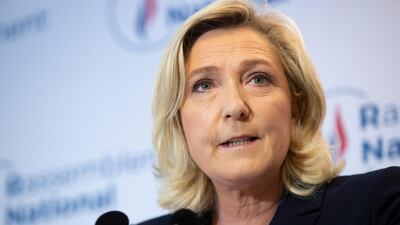France’s far right was “stopped in its tracks” at regional elections on Sunday, said a triumphant centre-right leader who is now a frontrunner to challenge Emmanuel Macron for the presidency next year.
Xavier Bertrand savoured his victory over the far-right National Rally (RN) in a result he said “gives me the strength to seek the nation’s vote” in 2022.
RN hoped to build momentum by taking control of a regional government for the first time but drew a blank by failing to win any of the 13 assemblies up for grabs.
Party leader Marine Le Pen blamed tactical voting after RN won about 20 per cent of the vote in Sunday’s second round, a drop since the last regional polls in 2015.
“We won't win in any region because incumbents entered into unnatural alliances and did all they could to keep us out and prevent us from showing the French our capacity to lead a regional administration,” she said.
It was also a sobering night for Mr Macron, whose centrist Republic on the Move (LREM) party did not win any regions on its own.
The result underlines LREM’s failure to put down local roots after Mr Macron founded the party and swept to victory in the 2017 presidential election.
Mr Macron had embarked on a nationwide tour in a bid to drum up support, which led to him being slapped by a member of the public.
LREM chief Stanislas Guerini described the results as a "disappointment for the presidential majority".
Polls suggest that the 2022 race could come down to a rematch between Mr Macron and Ms Le Pen, who was the runner-up in the 2017 election.
But Mr Bertrand's candidacy has the potential to shake up the race as the centre right seeks a comeback after finishing third in 2017.

Centre right celebrates
After defeating the National Rally to win the Hauts-de-France region, Mr Bertrand touted himself as the strongest bulwark against the far right.
“The far right has been stopped in its tracks and we have pushed it back sharply,” he said. “This result gives me the strength to go out and meet all the French.”
The conservatives enjoyed another victory in Provence-Alpes-Cote d’Azur (PACA), which was seen as the RN’s best shot at winning a regional assembly.
Ms Le Pen has spent a decade trying to shed her party’s extremist image after taking over from her father Jean-Marie Le Pen, the founder of what was formerly the National Front.
Winning a region for the first time would have boosted her party and raised questions over the “republican front” which usually sees mainstream voters team up to defeat the far right.
But the RN’s candidate in PACA, Thierry Mariani, was defeated by centre-right candidate Renaud Muselier by a margin of about 10 points.
"The logic of unity" was the winner, Mr Muselier said.
Valerie Pecresse, another potential presidential candidate from the centre right, was re-elected in the greater Paris region.
She defeated a 25-year-old rising star of the RN, Jordan Bardella, and held off a coalition of socialists and environmentalists on the left.
The results leave the right in charge of seven regions, the left with five and Corsican nationalists in office on the Mediterranean island.
Turnout was estimated at about 34 per cent, barely any improvement on the dismal showing in the first round which sparked concern among politicians.
Warm weather coinciding with the lifting of Covid-19 restrictions was blamed partly for the lack of enthusiasm.
Mr Macron said all parties had to learn lessons from the low turnout.
"The abstention rate says a lot of things. We must all draw the consequences from it," he said.


